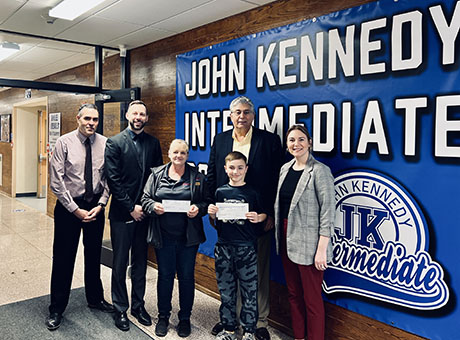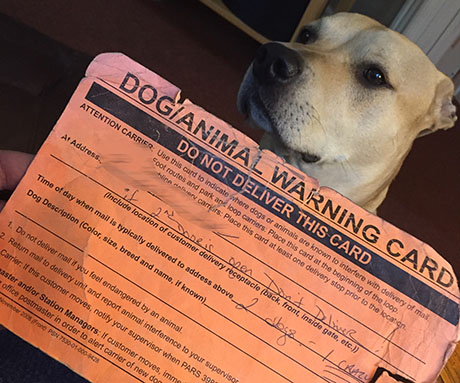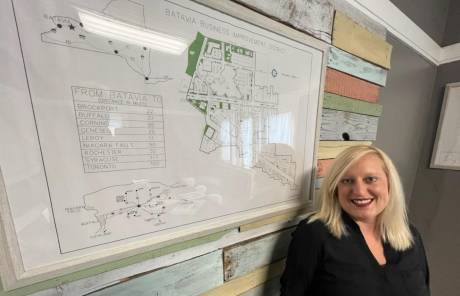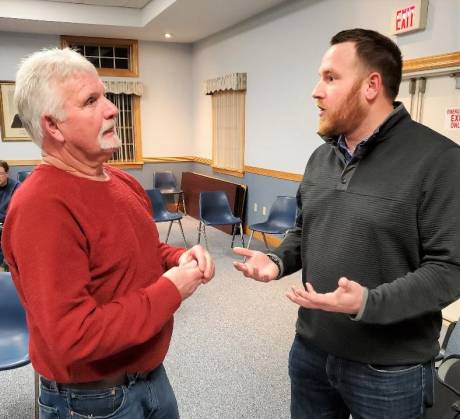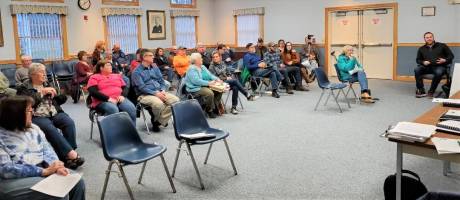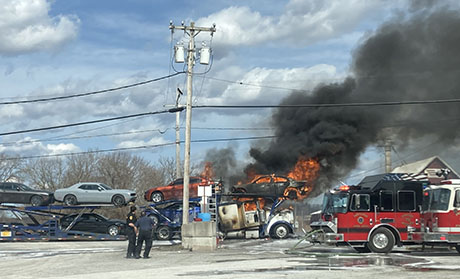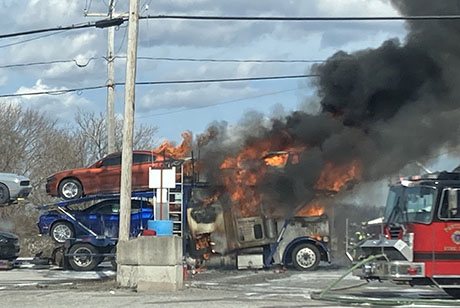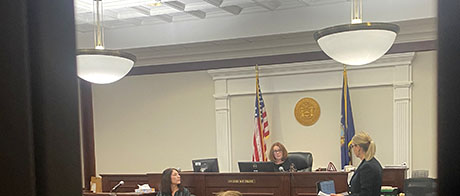The Town of Stafford Zoning Board of Appeals on Monday night tabled an application for a variance to the municipality’s solar ordinance from BW Solar on behalf of a Batavia Stafford Townline Road couple seeking to put a pair of 5-megawatt systems on their property.
Following a public hearing that turned into a “Q & A” with BW Solar Project Developer Dan Huntington, the ZBA voted unanimously to put the action on hold for 30 days. It made its decision at the request of Chair Michael Lathan, who said he had several questions for the town attorney.
Lathan said he expects the board to make a determination at its next meeting on April 18.
About 30 residents attended the hour and 45 minute session that became necessary since BW Solar’s site plan included setbacks (distances from residential and/or nonresidential property lines) that were less than stipulated in Stafford’s solar law.
The Woods own and operate a large farm (and also lease and farm adjoining land) and desire to use about 60 acres for the two side-by-side ground-mounted solar systems. One will cover 31.08 acres and the other will utilize 28.32 acres in a district near College Road zoned as Industrial Park, which the town has deemed appropriate for solar.
While the setbacks were the primary focus, town residents fired off queries on related subjects – most notably the Stafford solar ordinance, itself, as well as impacts to real property value, health, the environment and the rural nature of the town.
RESIDENT CITES SOLAR LAW
Diane Hawn, a Stafford resident for 24 years, read three times from the town’s ordinance on Solar Energy Facilities, asking if BW Solar has followed the letter of the law by establishing a $150,000 escrow account and maintaining umbrella insurance coverage of $10 million during the application process.
“If these haven’t been established, with that huge thing in 2018 (the drafting of the solar ordinance), how can this even be happening right now?” she asked.
Hawn went back and forth with Lathan and Huntington on whether these fees needed to be paid upfront, with the application fee, or if that was part of the next step in the process – after BW Solar was granted the variances it sought to proceed with the project.
Huntington, responding to a question about the escrow account, said he hasn’t encountered that in his other solar projects.
“A $150,000 escrow account controlled by the town, even in a decommissioning sense, has never been established where the town controls the escrow account,” he said. “I can’t say across New York State that’s not true, but in all of the projects that I’ve done … I’ve never seen something of that nature.”
Town Board member Ron Panek advised that the escrow account for solar mirrors the one set up for a Planned Unit Development (such as a senior housing complex or trailer park).
“Is it unusual?” he said. “No, it’s right in our other laws.”
IN DEFENSE OF SOLAR LAW
Panek said much effort and time (nearly two years) were put into the wording of the solar law, and, since then, the Town of Le Roy has used parts of the law and the Town of Alexander’s law “is word for word, identical (to Stafford’s).”
Hawn also quoted another section of the law where it states that Stafford’s Comprehensive Plan “desires to maintain the pastoral, rural nature of this region. An industrial solar energy facility is in conflict with the culture and character of the community.”
ZBA alternate member Tim Thomas noted that the Wood property is in an industrial zoned area.
“Somebody could come in and build a manufacturing facility,” he said. “There’s probably a variety of industrial-type complexes that could go there. So, I would just ask to keep that in mind as you’re looking at this. Solar complexes – solar farms – really don’t demand a lot of services in the town.”
Huntington has maintained all along – in dealings with the Genesee County Planning Board and Town of Stafford officials and attorney – that BW Solar has crafted a solar site plan that minimizes the negative effect on the couple of neighbors by moving it away from the road and placing the two systems next to each other to enable the Woods to farm more of their land.
“The Town Board can’t reasonably do all the work they have to do, if we can’t even decide where the footprint of this thing is going to lie,” he said.
“So, that’s why we’re at the variance part first – to determine you can build there, you can’t build there. Once we know that, then we can say, we’ll outline the footprint, if we have to alter these designs and resubmit them to the Town Board, and now we have a clear, defined footprint that we can review everything, without changes from there.”
CONCERN OVER REAL PROPERTY CLAUSE
The ZBA’s inability to grant a variance to the town’s solar ordinance real property value protection clause, as indicated by the town attorney, is cause for concern, Huntington acknowledged. The law states that the solar operator shall assure there will be no loss in property value for any property within 2,500 feet of the solar farm – a significant distance.
“To create some type of an agreement with every single one of those homeowners is something that I’ve never heard of in any project that I’ve been involved in in New York State,” he said. “On this specific project, there is actually only one homeowner that’s adjoining the property.”
He said having to enter into contracts with up to 100 property owners in that 2,500-foot radius “could quadruple the cost of the project,” adding that if it came down to that, BW Solar would be forced to “defend in court.”
Huntington said he “can sympathize” with the one resident next to the proposed solar farm (who was in attendance last night).
“He has a beautiful home across the street that does overlook a beautiful farm field – I can’t argue that fact,” he said. “I can sympathize with his concerns …
“The variances we are asking for to pull it away from the road on which he lives on – specifically the 200 feet down to zero and the eastern side, 200 feet to 100 feet, would actually bring the solar array away from the road in such a manner that would actually allow his view, at least 50 percent of it, to stay farm fields. If those variances aren’t granted, the only place we can bring the remainder of those panels, to follow the law, is up into that bend, which would eat up his entire view.”
He said he would work with the resident to ensure the screening was adequate, not only at the beginning of the project but down the road.
OTHER DISCUSSION TOPICS
Other points brought up during the meeting:
- On health hazards: Huntington said “studies have shown there are no health hazards associated with it when a solar farm is functioning properly, and maintained properly … and part of our duty is to make sure that a facility is operating at a high efficiency.” He added that a State Environmental Quality Review is required and BW Solar plans to notify agencies such as the Department of Environmental Conservation, Department of Transportation, Army Corps of Engineers and local governmental officials at the proper time.
- On employees needed to build and maintain the system: Huntington said it is likely that union electricians would be hired due to the high voltage and that he hoped that local residents would be hired for seasonal maintenance.
- On seeking tax abatements: Huntington said the company would seek a payment in lieu of taxes agreement with the Genesee County Economic Development Center. “It’s a pretty standard process for it, and it’s $6,000 per megawatt, which is split between the town, school district and county.”
INACCURACIES POINTED OUT
Lathan, at the outset, pointed out some inaccuracies in a notice placed in a local Pennysaver over the weekend – also calling out the person (or persons) responsible for the ad for not putting a name on it..
“We do not make amendments and we do not make laws,” he said. “We try to grant relief to residents on the law, that’s all we’re here to do.”
He also read where it said the request would be in “direct contradiction” to the Stafford zoning law.
“Almost every decision that that board makes is a contradiction to the zoning law," he said. "That’s why we try to grant relief.”
The ZBA chair also took exception to the notice’s charged that any change would show a “direct bias in favor of the company and a select few to benefit from this project.”
“I've had the privilege to be on this board for 14 years. We have never made a decision that was biased one way or the other. And I take offense to that, whoever put this in.”
Photo at top: Michael Lathan, left, ZBA chair, and Dan Huntington of BW Solar, talk following Monday night's public hearing. Photo at bottom: The session drew about 30 Stafford residents to the Town Hall. Photos by Mike Pettinella.
Previously: Planning board falls back on its purpose in decision to 'disapprove' Stafford solar project variance requests


